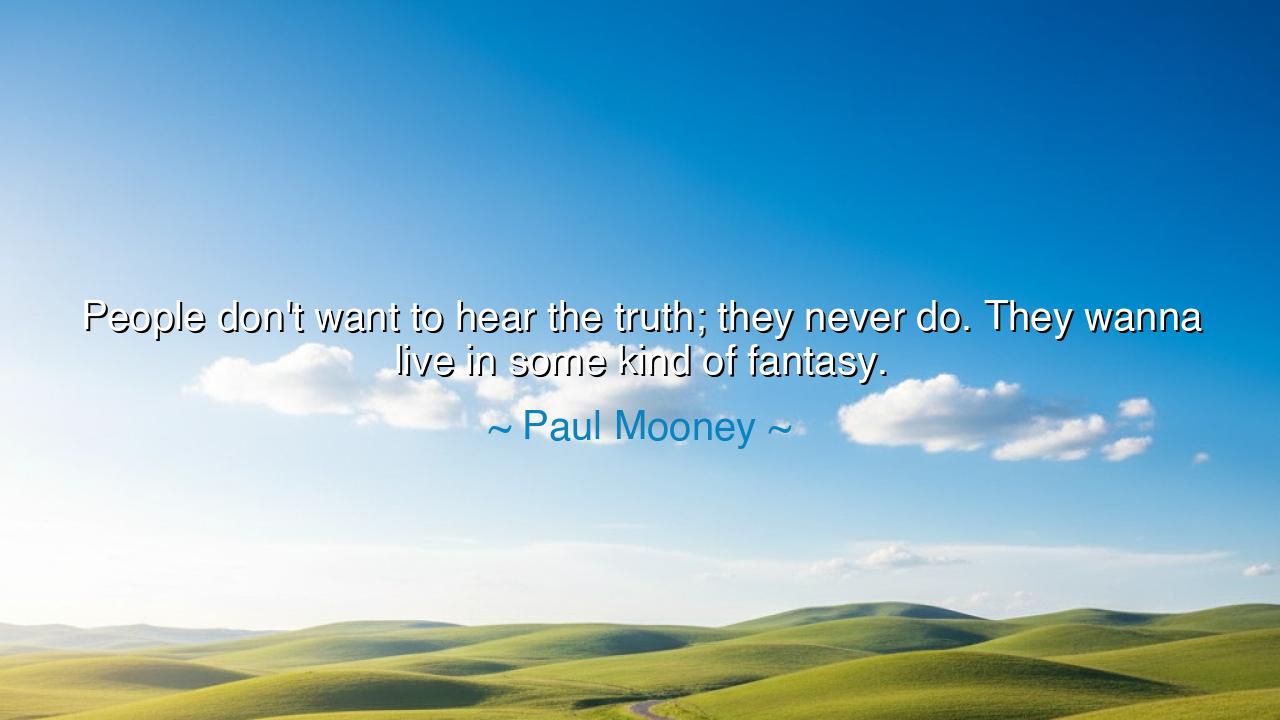
People don't want to hear the truth; they never do. They wanna
People don't want to hear the truth; they never do. They wanna live in some kind of fantasy.






The words of Paul Mooney—“People don’t want to hear the truth; they never do. They wanna live in some kind of fantasy”—are both a lament and a revelation. In them lies the eternal struggle of humanity: the soul’s longing for truth, and the mind’s weakness for illusion. Mooney, a comedian whose art was rooted in unmasking the hypocrisies of society, understood that truth is sharp, uncomfortable, and unrelenting. Most men, when confronted with it, turn away. They seek instead the soft comfort of fantasies, illusions that make life easier to bear, even if they rest upon lies.
The ancients also warned of this tendency. In Plato’s Republic, the people chained in the cave preferred the shadows to the painful brilliance of the sun. When shown the real world, their eyes ached, and they longed to return to illusions. Mooney speaks in this same spirit, reminding us that humanity is drawn again and again to fantasies—of wealth without labor, of power without corruption, of innocence without guilt. Truth strips away these illusions, exposing what we would rather not see: injustice, mortality, selfishness, and suffering.
History provides powerful confirmation of Mooney’s insight. Consider the fate of Galileo Galilei, who told the truth about the stars and the Earth’s motion. His discoveries threatened the fantasies of a universe designed to flatter mankind’s central place. The people, and the powers who ruled them, preferred the comfort of falsehood. They silenced Galileo, forcing him to whisper truth while the world clung to its fantasy. Only centuries later did his words rise again in triumph. His story proves that people often resist truth until fantasy can no longer sustain itself.
Or consider the age of slavery. For centuries, nations lived in the fantasy that one race could own another, that chains could be justified by lies of superiority. The truth—that all men are created equal—was known in the hearts of many, yet despised and resisted, for it was painful, costly, and revolutionary. When abolitionists raised this truth, many scoffed, resisted, or violently opposed it, preferring the fantasy that preserved their wealth and power. Yet eventually, truth shattered illusion, though only after rivers of blood and tears.
Mooney’s words are not only about history, but about the daily lives of individuals. How often do people prefer fantasy in their own affairs? They hide from the truth of their weaknesses, pretend their relationships are sound when they are broken, imagine that tomorrow will solve what today demands. Fantasy comforts the heart in the moment, but it leads to ruin in the end. To face truth, even when painful, is to embrace growth and freedom. To cling to fantasy is to live in chains of one’s own making.
The lesson is this: do not be like the masses who fear truth and embrace illusions. Instead, discipline your soul to love truth, even when it wounds. Seek truth in your speech, in your actions, in your understanding of yourself and of the world. Do not allow fantasies to guide your life, for though they flatter, they will betray you. Truth alone, though harsh, will set you free. To love truth is to walk in strength; to love fantasy is to walk in weakness.
Therefore, O seeker, remember Paul Mooney’s wisdom: most people flee from truth into the arms of fantasy—but you must not. Train your heart to endure the sharp light of reality, for in that light lies freedom, dignity, and greatness. Be not seduced by illusions that flatter but enslave. Embrace truth, though it blinds at first, for it alone will guide you through the darkness of life and leave you standing firm when fantasies crumble into dust.






AAdministratorAdministrator
Welcome, honored guests. Please leave a comment, we will respond soon